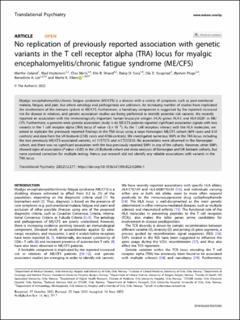| dc.contributor.author | Ueland, Marthe | |
| dc.contributor.author | Hajdarevic, Riad | |
| dc.contributor.author | Mella, Olav | |
| dc.contributor.author | Strand, Elin Bolle | |
| dc.contributor.author | Daysi Duarte, Sosa | |
| dc.contributor.author | Saugstad, Ola Didrik | |
| dc.contributor.author | Fluge, Øystein | |
| dc.contributor.author | Lie, Benedicte Alexandra | |
| dc.contributor.author | Viken, Marte Kathrine | |
| dc.date.accessioned | 2023-01-02T10:43:06Z | |
| dc.date.available | 2023-01-02T10:43:06Z | |
| dc.date.created | 2022-10-04T13:01:53Z | |
| dc.date.issued | 2022 | |
| dc.identifier.issn | 2158-3188 | |
| dc.identifier.uri | https://hdl.handle.net/11250/3040263 | |
| dc.description.abstract | Myalgic encephalomyelitis/chronic fatigue syndrome (ME/CFS) is a disease with a variety of symptoms such as post-exertional malaise, fatigue, and pain, but where aetiology and pathogenesis are unknown. An increasing number of studies have implicated the involvement of the immune system in ME/CFS. Furthermore, a hereditary component is suggested by the reported increased risk for disease in relatives, and genetic association studies are being performed to identify potential risk variants. We recently reported an association with the immunologically important human leucocyte antigen (HLA) genes HLA-C and HLA-DQB1 in ME/ CFS. Furthermore, a genome-wide genetic association study in 42 ME/CFS patients reported significant association signals with two variants in the T cell receptor alpha (TRA) locus (P value <5 × 10−8 ). As the T cell receptors interact with the HLA molecules, we aimed to replicate the previously reported findings in the TRA locus using a large Norwegian ME/CFS cohort (409 cases and 810 controls) and data from the UK biobank (2105 cases and 4786 controls). We investigated numerous SNPs in the TRA locus, including the two previously ME/CFS-associated variants, rs11157573 and rs17255510. No associations were observed in the Norwegian cohort, and there was no significant association with the two previously reported SNPs in any of the cohorts. However, other SNPs showed signs of association (P value <0.05) in the UK Biobank cohort and meta-analyses of Norwegian and UK biobank cohorts, but none survived correction for multiple testing. Hence, our research did not identify any reliable associations with variants in the TRA locus. | en_US |
| dc.language.iso | eng | en_US |
| dc.publisher | Nature | en_US |
| dc.rights | Navngivelse 4.0 Internasjonal | * |
| dc.rights.uri | http://creativecommons.org/licenses/by/4.0/deed.no | * |
| dc.title | No replication of previously reported association with genetic variants in the T cell receptor alpha (TRA) locus for myalgic encephalomyelitis/chronic fatigue syndrome (ME/CFS) | en_US |
| dc.type | Journal article | en_US |
| dc.type | Peer reviewed | en_US |
| dc.description.version | publishedVersion | en_US |
| dc.rights.holder | Copyright 2022 The Author(s) | en_US |
| dc.source.articlenumber | 277 | en_US |
| cristin.ispublished | true | |
| cristin.fulltext | original | |
| cristin.qualitycode | 1 | |
| dc.identifier.doi | 10.1038/s41398-022-02046-1 | |
| dc.identifier.cristin | 2058376 | |
| dc.source.journal | Translational Psychiatry | en_US |
| dc.identifier.citation | Translational Psychiatry. 2022, 12, 277. | en_US |
| dc.source.volume | 12 | en_US |

